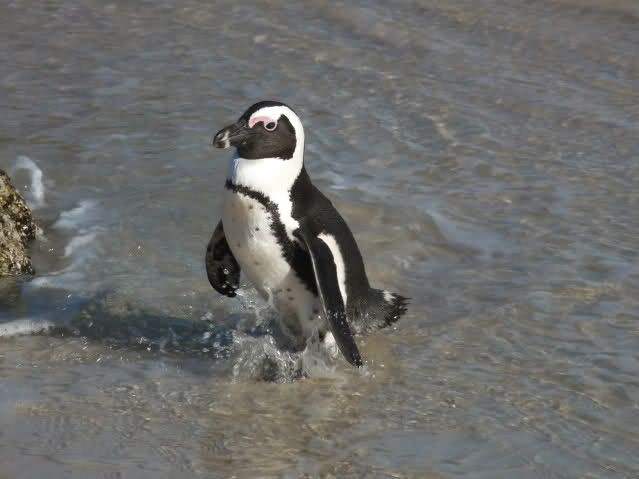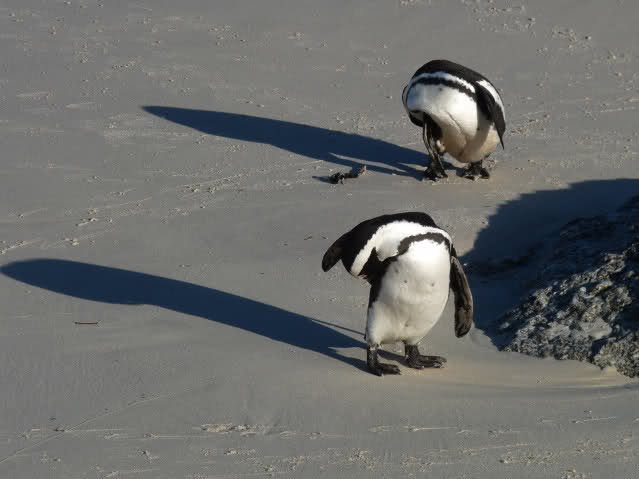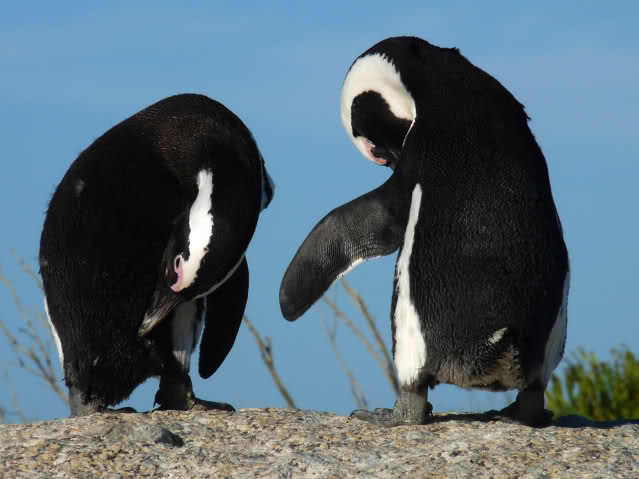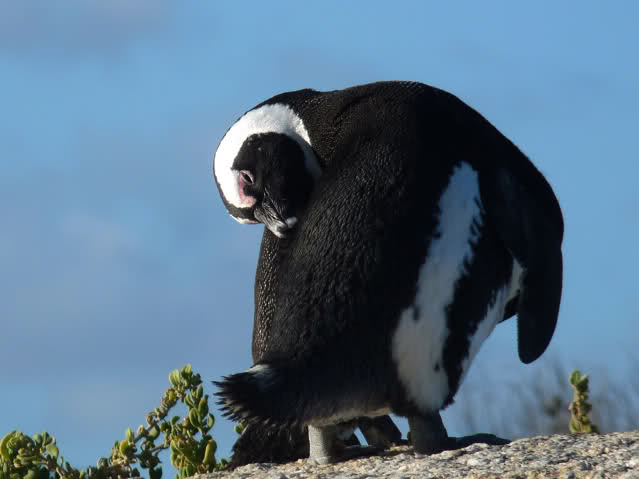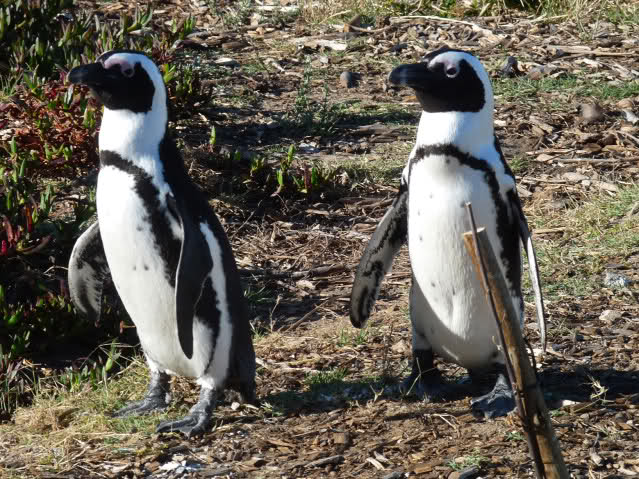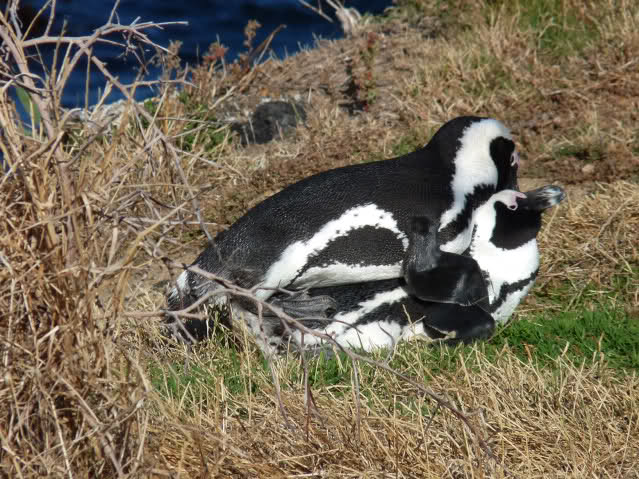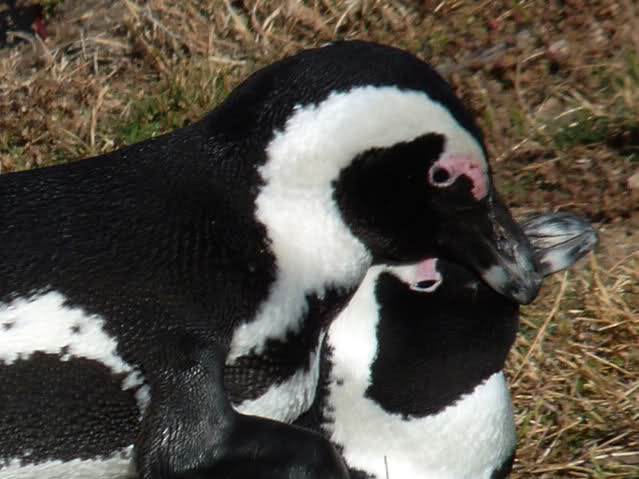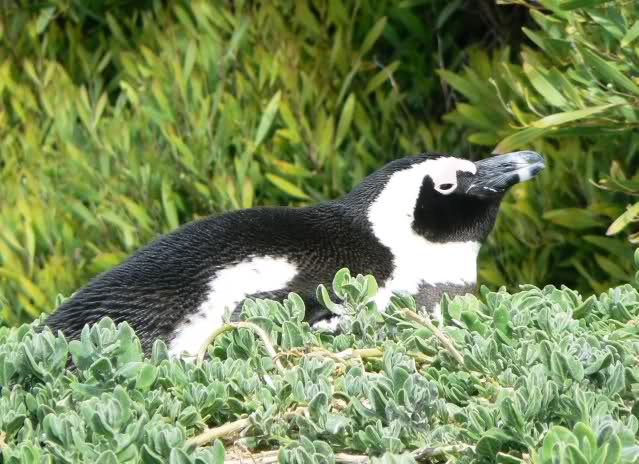Crested Barbet wrote:And here the African Penguins from Boulders.
Hi, here I am. What to do now?
Yes, let’s dance !
Maybe a little bit closer?
There must be a place for us …
African Penguin
Re: Bird Photos - Not Park Specific
African Penguin
African or Jackass Penguin
I was asked to do the April "Wild Bird of the Month" by Toko. That's like asking a teetotaler to be a judge at a wine tasting. I suspect she's trying to distract me from posting anymore sophomoric jokes in my Photo Book "Generations…" topic.
I chose Jackass Penguins because they are the only South African bird I can, with any assurance, identify and their common name has an endearing quality.
So I'll start out with a sophomoric penguin joke...
What do you get when you cross a penguin with an alligator?
I don't know, but don't try to fix its bow tie.
I was asked to do the April "Wild Bird of the Month" by Toko. That's like asking a teetotaler to be a judge at a wine tasting. I suspect she's trying to distract me from posting anymore sophomoric jokes in my Photo Book "Generations…" topic.
I chose Jackass Penguins because they are the only South African bird I can, with any assurance, identify and their common name has an endearing quality.
So I'll start out with a sophomoric penguin joke...
What do you get when you cross a penguin with an alligator?
I don't know, but don't try to fix its bow tie.
Re: African Penguin - Bird of the Month April 2015
African or Jackass Penguin Spheniscus demersus (Linnaeus, 1758)
Other Common names: Black-footed penguin, Cape penguin, pikkewyn (Afrikaans) and nombombiyane (Xhosa).
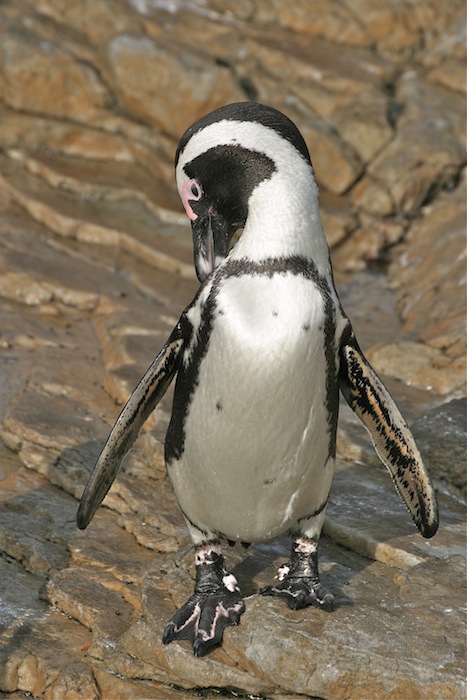
Derivation of Scientific Name
The genus name Spheniscus is derived from the ancient Greek word sphen, which means wedge, referring to the streamlined body shape of the African penguin. The species name demersus is Latin meaning plunging or sinking, referring to its diving behaviour. The common name ’jackass’ refers to its call, which sounds similar to that of a donkey, even though most other penguins produce a similar sound.
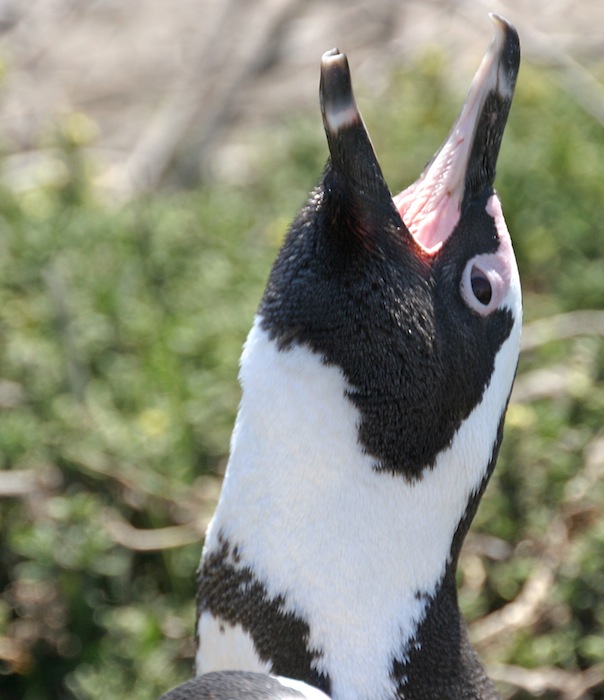
The African penguin is endemic to coastal areas of southern Africa. It is a charismatic species that is known for its loud donkey-like braying noises, distinctive black and white plumage and large breeding colonies. It is a flightless bird that is well adapted to life at sea and land. The body is streamlined with modified wings that resemble flippers, which enable them to be efficient swimmers, and a thick coat with overlapping feathers that assists with waterproofing, wind resistance and insulation. The African penguin has experienced rapid population declines over the past century as a result of overexploitation for food, habitat modification of nesting sites, oil spillages, and competition for food resources with commercial fishing. As a result it is classified as Endangered by the IUCN Red List and it is listed under Appendix II of the CITES (Convention on International Trade of Endangered Species). In South Africa, it is further listed as a protected species under the National Environment Management: Biodiversity Act (No. 10 of 2004).
Description
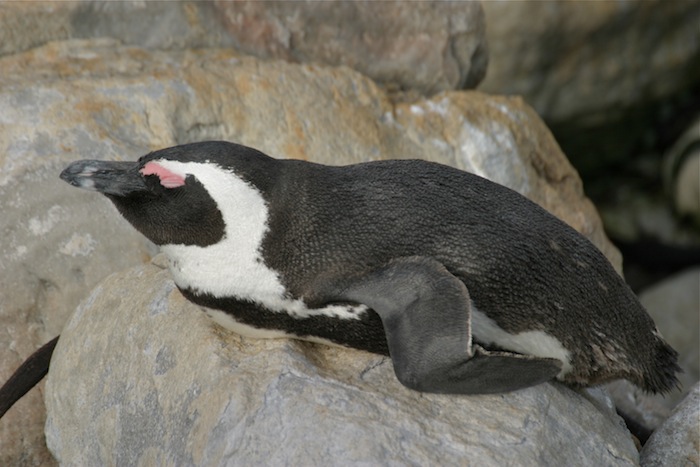
The feathers in adults are specialised to form a thick coat of overlapping layers that assists with waterproofing, wind resistance and insulation. The dorsal or back part of the body part is black and the belly is white. The white belly has a thick black stripe curving across the top of the chest, and down the flanks towards the legs. African penguins have black webbed feet and a black facial mask with distinctive pink patches of skin above the eyes. Each African penguin has a unique and distinct pattern of black spots on the white chest that can be used to distinguish individuals from one another. It has a black bill and shortened tail.
Males and females have the same plumage, making it difficult to differentiate between sexes. However, males can be distinguished from females by a slightly bigger and broader bill. Adults weigh on average 2.2–3.5 kg and are 60– 70 cm in height. Juveniles differ from adults in having blue-grey plumage with no white facial markings and no bold, delineated markings. They have dark upper-parts lacking both spots and band on the chest.
Getting Around
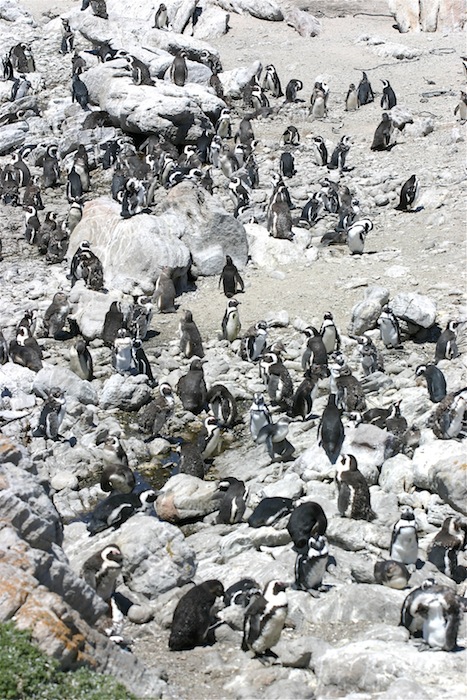
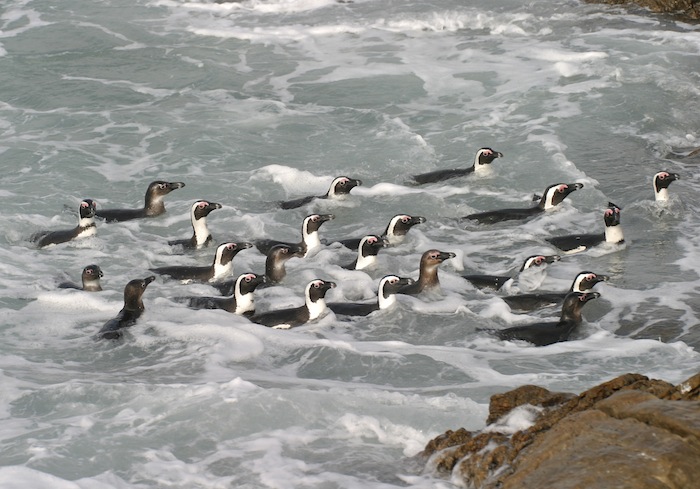
African penguins are very clumsy on land, waddling upright with flippers held away from the body as if they are drunk. They are, however, highly specialised for a life at sea and they are efficient swimmers that can reach speeds of up to 20 km/h, cruise at 4–7 km/h and dive down to 130 m.
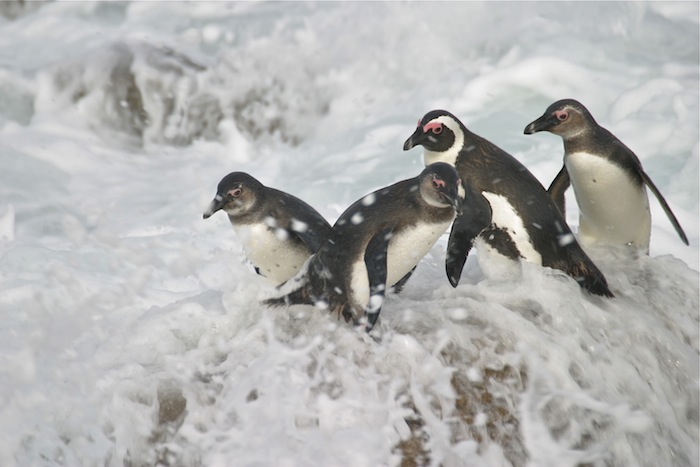
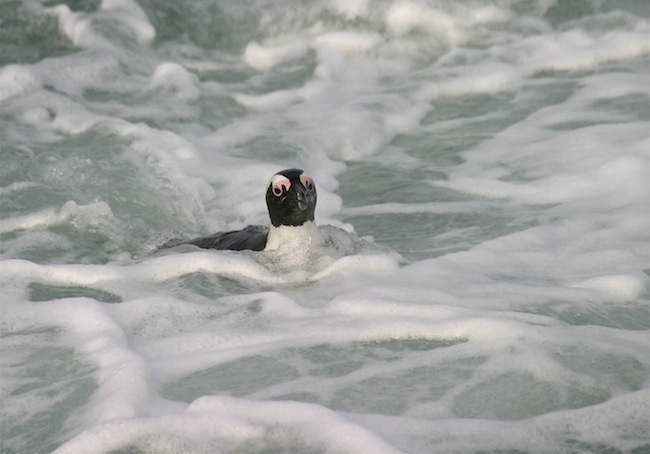
Distribution
The African penguin is the only penguin species that occurs off the coast of Africa, and it is endemic to the coast of southern Africa, from Hollams Bird Island, near the central Namibian coast, to Algoa Bay off the coast of the Eastern Cape, South Africa. They occur mostly on islands along the coast, but there are two populations on the mainland in South Africa, at Betty’s Bay and Boulders Beach in the Cape Town area.
Habitat
African penguins are found along coastal areas and offshore islands. Their preferred habitats are flat sandy areas with sparse or abundant vegetation growth, or steep, rocky sites with sparse vegetation.
Other Common names: Black-footed penguin, Cape penguin, pikkewyn (Afrikaans) and nombombiyane (Xhosa).

Derivation of Scientific Name
The genus name Spheniscus is derived from the ancient Greek word sphen, which means wedge, referring to the streamlined body shape of the African penguin. The species name demersus is Latin meaning plunging or sinking, referring to its diving behaviour. The common name ’jackass’ refers to its call, which sounds similar to that of a donkey, even though most other penguins produce a similar sound.

The African penguin is endemic to coastal areas of southern Africa. It is a charismatic species that is known for its loud donkey-like braying noises, distinctive black and white plumage and large breeding colonies. It is a flightless bird that is well adapted to life at sea and land. The body is streamlined with modified wings that resemble flippers, which enable them to be efficient swimmers, and a thick coat with overlapping feathers that assists with waterproofing, wind resistance and insulation. The African penguin has experienced rapid population declines over the past century as a result of overexploitation for food, habitat modification of nesting sites, oil spillages, and competition for food resources with commercial fishing. As a result it is classified as Endangered by the IUCN Red List and it is listed under Appendix II of the CITES (Convention on International Trade of Endangered Species). In South Africa, it is further listed as a protected species under the National Environment Management: Biodiversity Act (No. 10 of 2004).
Description

The feathers in adults are specialised to form a thick coat of overlapping layers that assists with waterproofing, wind resistance and insulation. The dorsal or back part of the body part is black and the belly is white. The white belly has a thick black stripe curving across the top of the chest, and down the flanks towards the legs. African penguins have black webbed feet and a black facial mask with distinctive pink patches of skin above the eyes. Each African penguin has a unique and distinct pattern of black spots on the white chest that can be used to distinguish individuals from one another. It has a black bill and shortened tail.
Males and females have the same plumage, making it difficult to differentiate between sexes. However, males can be distinguished from females by a slightly bigger and broader bill. Adults weigh on average 2.2–3.5 kg and are 60– 70 cm in height. Juveniles differ from adults in having blue-grey plumage with no white facial markings and no bold, delineated markings. They have dark upper-parts lacking both spots and band on the chest.
Getting Around


African penguins are very clumsy on land, waddling upright with flippers held away from the body as if they are drunk. They are, however, highly specialised for a life at sea and they are efficient swimmers that can reach speeds of up to 20 km/h, cruise at 4–7 km/h and dive down to 130 m.


Distribution
The African penguin is the only penguin species that occurs off the coast of Africa, and it is endemic to the coast of southern Africa, from Hollams Bird Island, near the central Namibian coast, to Algoa Bay off the coast of the Eastern Cape, South Africa. They occur mostly on islands along the coast, but there are two populations on the mainland in South Africa, at Betty’s Bay and Boulders Beach in the Cape Town area.
Habitat
African penguins are found along coastal areas and offshore islands. Their preferred habitats are flat sandy areas with sparse or abundant vegetation growth, or steep, rocky sites with sparse vegetation.
- nan
- Posts: 26311
- Joined: Thu May 31, 2012 9:41 pm
- Country: Switzerland
- Location: Central Europe
- Contact:
Re: African Penguin - Bird of the Month April 2015
will search... I have not a lot, "only" from Boulder
strange, Penguin in French is from the North and for the South it's "Manchot"
a lot of difference, some can flight, the others not
strange, Penguin in French is from the North and for the South it's "Manchot"
a lot of difference, some can flight, the others not
Kgalagadi lover… for ever
https://safrounet.piwigo.com/
https://safrounet.piwigo.com/
- Flutterby
- Posts: 44150
- Joined: Sat May 19, 2012 12:28 pm
- Country: South Africa
- Location: Gauteng, South Africa
- Contact:
Re: African Penguin - Bird of the Month April 2015
Nice choice Exfem. I also only have a couple of pics from Boulders.
In January 2003 I took the Brat to Boulders to see the penguins. He was nearly 4 years old, but we didn't realise how far we had to walk to get to the penguins. My cousin and I took turns carrying him, but he still had to walk quite a lot of the way. After seeing the penguins and walking the long way back to the car the Brat was very unhappy, and declared "I hate penguins"!!
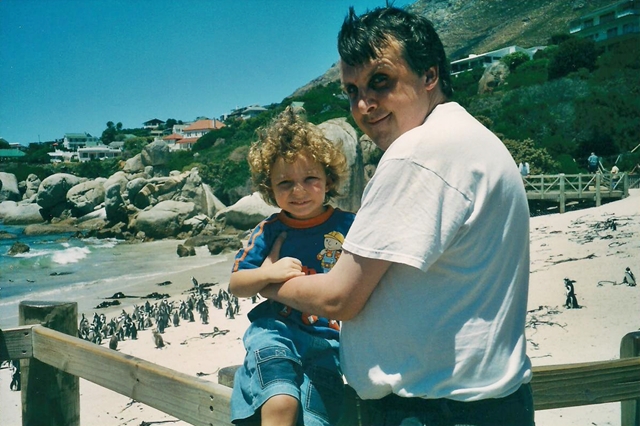
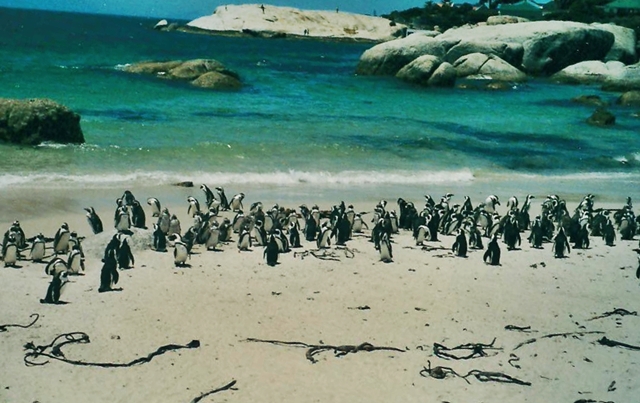
In January 2003 I took the Brat to Boulders to see the penguins. He was nearly 4 years old, but we didn't realise how far we had to walk to get to the penguins. My cousin and I took turns carrying him, but he still had to walk quite a lot of the way. After seeing the penguins and walking the long way back to the car the Brat was very unhappy, and declared "I hate penguins"!!


- Flutterby
- Posts: 44150
- Joined: Sat May 19, 2012 12:28 pm
- Country: South Africa
- Location: Gauteng, South Africa
- Contact:
Re: African Penguin - Bird of the Month April 2015
When my niece was very small she thought "penguin" was pronounced "pink one", so obviously that has stuck and we now all call penguins "pink ones"! 
-
Peter Connan
- Posts: 435
- Joined: Wed Sep 17, 2014 7:05 pm
- Country: South Africa
- Contact:
- Lisbeth
- Site Admin
- Posts: 67398
- Joined: Sat May 19, 2012 12:31 pm
- Country: Switzerland
- Location: Lugano
- Contact:
Re: African Penguin - Bird of the Month April 2015
Is this the way out??
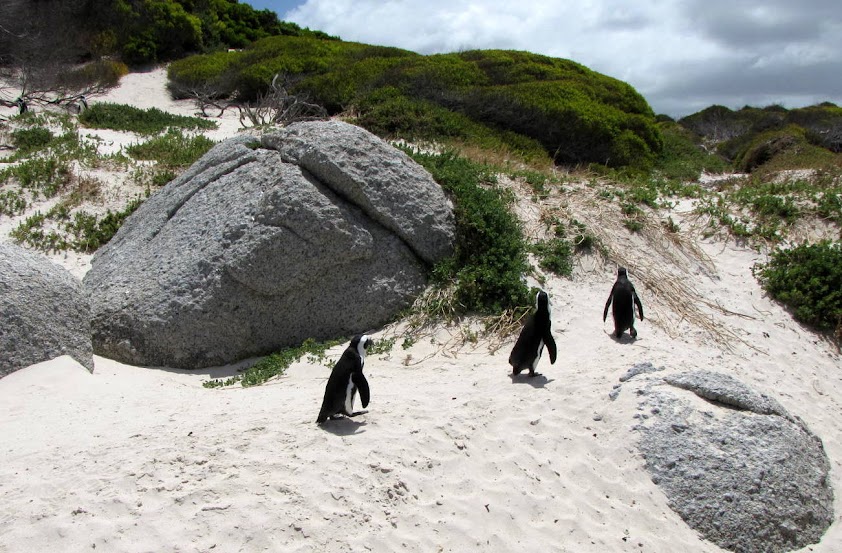
"Education is the most powerful weapon which you can use to change the world." Nelson Mandela
The desire for equality must never exceed the demands of knowledge
The desire for equality must never exceed the demands of knowledge



